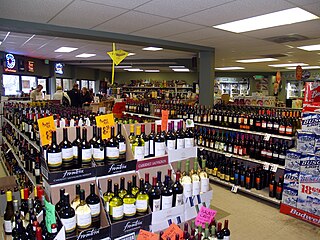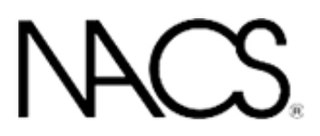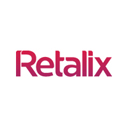
Mobil is a petroleum brand owned and operated by American oil and gas corporation ExxonMobil. The brand was formerly owned and operated by an oil and gas corporation of the same name, which itself merged with Exxon to form ExxonMobil in 1999.

A convenience store, convenience shop, bodega, corner store, corner shop, or superette is a small retail store that stocks a range of everyday items such as tea, coffee, groceries, fruits, vegetables, snacks, confectionery, soft drinks, ice creams, tobacco products, lottery tickets, over-the-counter drugs, toiletries, newspapers and magazines.

A filling station is a facility that sells fuel and engine lubricants for motor vehicles. The most common fuels sold in the 2010s were gasoline and diesel fuel.

Shopping is an activity in which a customer browses the available goods or services presented by one or more retailers with the potential intent to purchase a suitable selection of them. A typology of shopper types has been developed by scholars which identifies one group of shoppers as recreational shoppers, that is, those who enjoy shopping and view it as a leisure activity.
A fuel tax is an excise tax imposed on the sale of fuel. In most countries the fuel tax is imposed on fuels which are intended for transportation. Fuel tax receipts are often dedicated or hypothecated to transportation projects, in which case the fuel tax can be considered a user fee. In other countries, the fuel tax is a source of general revenue. Sometimes, a fuel tax is used as an ecotax, to promote ecological sustainability. Fuel taxes are often considered by government agencies such as the Internal Revenue Service as regressive taxes.

Online shopping is a form of electronic commerce which allows consumers to directly buy goods or services from a seller over the Internet using a web browser or a mobile app. Consumers find a product of interest by visiting the website of the retailer directly or by searching among alternative vendors using a shopping search engine, which displays the same product's availability and pricing at different e-retailers. As of 2020, customers can shop online using a range of different computers and devices, including desktop computers, laptops, tablet computers and smartphones.

Sheetz, Inc. is an American chain of convenience stores. Its stores, which are open 24/7 year-round, offer made-to-order fast food, and most include a gas station, while a few locations are full-scale truck stops, offering showers and a laundromat. The family-owned company has over 21,000 employees, and operates more than 750 company-owned stores located in Central and Western Pennsylvania, West Virginia, Maryland, Ohio, Virginia, North Carolina, and Michigan.

A liquor store is a retail business that predominantly sells prepackaged alcoholic beverages, including liquors, wine or beer, usually intended to be consumed off the store's premises. Depending on region and local idiom, they may also be called an off-licence, off-sale, bottle shop, bottle store or, colloquially, bottle-o, liquor store or other similar terms. A very limited number of jurisdictions have an alcohol monopoly. In US states that are alcoholic beverage control (ABC) states, the term ABC store may be used.

Once the strategic plan is in place, retail managers turn to the more managerial aspects of planning. A retail mix is devised for the purpose of coordinating day-to-day tactical decisions. The retail marketing mix typically consists of six broad decision layers including product decisions, place decisions, promotion, price, personnel and presentation. The retail mix is loosely based on the marketing mix, but has been expanded and modified in line with the unique needs of the retail context. A number of scholars have argued for an expanded marketing, mix with the inclusion of two new Ps, namely, Personnel and Presentation since these contribute to the customer's unique retail experience and are the principal basis for retail differentiation. Yet other scholars argue that the Retail Format should be included. The modified retail marketing mix that is most commonly cited in textbooks is often called the 6 Ps of retailing.

A fuel card or fleet card is used as a payment card most commonly for gasoline, diesel, and other fuels at gas stations. Fleet cards can also be used to pay for vehicle maintenance and expenses at the discretion of the fleet owner or manager. Most fuel cards are charge cards.

The usage and pricing of gasoline results from factors such as crude oil prices, processing and distribution costs, local demand, the strength of local currencies, local taxation or subsidy, and the availability of local sources of gasoline (supply). Since fuels are traded worldwide, the trade prices are similar. The price paid by consumers largely reflects national pricing policy. Most countries impose taxes on gasoline (petrol), which causes air pollution and climate change; whereas a few, such as Venezuela, subsidize the cost. Some country's taxes do not cover all the negative externalities, that is they do not make the polluter pay the full cost. Western countries have among the highest usage rates per person. The largest consumer is the United States.

The National Association of Convenience Stores (NACS) is a trade association representing the convenience and fuel retailing industry. Founded in 1961, NACS has thousands of member companies, primarily in the United States but also in about 50 other countries. NACS conducts market research, hosts conferences and trade shows, and conducts political and legal advocacy. NACS is particularly concerned with the regulation of motor fuels, high credit card swipe fees, and labor law.
Test and learn is a set of practices followed by retailers, banks and other consumer-focused companies to test ideas in a small number of locations or customers to predict impact. The process is often designed to answer three questions about any tested program before rollout:
- What impact will the program have on key performance indicators if executed across the network or customer base?
- Will the program have a larger impact on some stores/customers than others?
- Which components of the idea are actually working?

Retalix Ltd. is a former Israeli software company that developed, licensed, implemented and supported software applications for retailers, wholesalers and distributors of fast-moving consumer goods, mainly in the grocery, convenience store, and foodservice industries.

Pay at the pump is a system used at many filling stations, where customers can pay for their fuel by inserting a credit card, debit card, or fuel card into a slot on the pump, bypassing the requirement to make the transaction with the station attendant or to walk away from one's vehicle. A few areas have gas stations that use electronic tolling transponders as a method of payment, such as Via Verde in Portugal.
Gilbarco Inc., doing business as Gilbarco Veeder-Root, is a supplier of fuel dispensers, point of sales systems, payment systems, forecourt merchandising and support services. The company operates as a subsidiary of Vontier and its headquarters are in Greensboro, North Carolina, United States. It employs approximately 4,000 people worldwide, with sales, manufacturing, research, development, and service locations in North and South America, Europe, Asia, the Pacific Rim, Australia, the Middle East and Africa.

Everyday low price is a pricing strategy promising consumers a low price without the need to wait for sale price events or comparison shopping. EDLP saves retail stores the effort and expense needed to mark down prices in the store during sale events, and is also believed to generate shopper loyalty. It was noted in 1994 that the Walmart retail chain in the United States, which follows an EDLP strategy, would buy "feature advertisements" in newspapers on a monthly basis, while its competitors would advertise weekly. Other firms that have implemented or promoted EDLP are Procter & Gamble, Food Lion, Gordmans and Winn-Dixie.

A gasoline pump or fuel dispenser is a machine at a filling station that is used to pump gasoline (petrol), diesel, or other types of liquid fuel into vehicles. Gasoline pumps are also known as bowsers or petrol bowsers, petrol pumps, or gas pumps.
Retail back-office software is used to manage business operations that are not related to direct sales efforts and interfaces that are not seen by consumers. Typically, the business processes managed with back-office software include some combination of inventory control, price book management, manufacturing, and supply chain management (SCM). Back-office software is distinct from front-office software, which typically refers to customer relationship management (CRM) software used for managing sales, marketing, and other customer-centric activities.
The retail format influences the consumer's store choice and addresses the consumer's expectations. At its most basic level, a retail format is a simple marketplace, that is; a location where goods and services are exchanged. In some parts of the world, the retail sector is still dominated by small family-run stores, but large retail chains are increasingly dominating the sector, because they can exert considerable buying power and pass on the savings in the form of lower prices. Many of these large retail chains also produce their own private labels which compete alongside manufacturer brands. Considerable consolidation of retail stores has changed the retail landscape, transferring power away from wholesalers and into the hands of the large retail chains.














